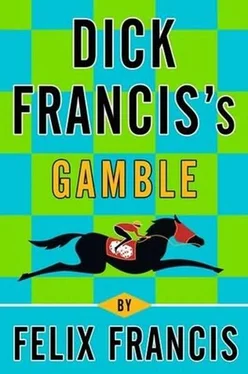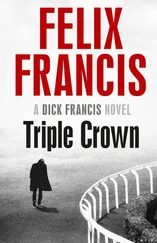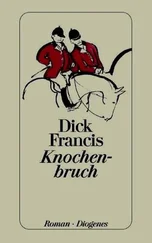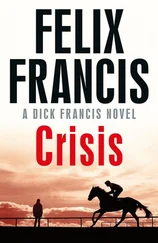“Put your hands on your head,” the policeman repeated with a degree of menace. “And you, sir,” he said, pointing his gun briefly towards Mr. Patel.
We both put our hands on our heads. Mr. Patel smiled broadly as if he thought the whole thing was a huge joke.
The second officer came forward and searched me, making sure he didn’t get between my chest and the muzzle of his colleague’s weapon. He then did likewise to Mr. Patel. Then he went through the shop and out of sight through a plastic curtain into the room behind. He soon reappeared, shaking his head. Only then did they relax a little.
“Sorry about that, sir,” said the first officer, securing his gun across his chest with a strap. “We can’t be too careful.”
I put my arms down. “What took you so long to get here?”
“We had to seal off the whole area,” he said. “Standard practice when there’s a report of a gunman.” He put his finger to his ear, clearly listening to someone on his radio earpiece. “Now, sir,” he said to me, “my superintendent wants to know if you have a description of this gunman.” His tone suggested that he didn’t altogether believe that a gunman had been stalking the streets of Finchley on a sleepy Tuesday afternoon in late April.
“I think I may have better than that,” I said. “Mr. Patel, does your closed-circuit TV system have a recorder?” I had passed some of my time waiting for the police by looking up at the small white video camera situated above the racks of cigarettes.
“Of course,” Mr. Patel replied. “I need to have it to catch the young scoundrels who steal my stock.”
“Then, officer,” I said. “please would you kindly inform Detective Chief Inspector Tomlinson of the Merseyside Police that we have the murderer of Herb Kovak caught on video.”
But how had he known where to find me? And why?
In the end, it was I who rang Chief Inspector Tomlinson, but not before the Armed Response Team had completed a full debriefing of the events in Finchley.
“So you say you saw a man standing outside your front door?” asked the response team superintendent as we stood in Mr. Patel’s shop.
“Yes,” I said. “He was ringing the doorbell.”
“And he had a gun?”
“Yes,” I said again, “with a silencer.”
There was something about his demeanor that said that he too didn’t really believe me. Mr. Patel hadn’t seen any gun nor, it seemed, had anyone else.
“He shot at me,” I said. “As I ran up Lichfield Grove. He shot at least twice. I heard the bullets whizz past my head.”
A team was dispatched to search and in due course one of them returned with two brass empty cases in a plastic bag.
Suddenly, everything became more serious. They believed me now.
“You will have to come to the police station,” said the superintendent. “To give a statement.”
“Can’t I do it here?” I asked.
“I need to reopen my shop,” said Mr. Patel anxiously.
“At my house, then?” I asked. “I need to get back to University College Hospital. My girlfriend had an operation this morning and she’s expecting me.”
Reluctantly the superintendent agreed to do it at my house, and we walked down Lichfield Grove together. The road had been closed to traffic, and about a dozen police officers in dark blue coveralls were moving up the road in line abreast, crawling on all fours.
“Looking for the bullets,” the superintendent informed me before I asked. “Don’t touch the door,” he said as we arrived at my house, “or the doorbell.”
I carefully opened the door with my key, and we went into the kitchen.
“Now, Mr. Foxton,” the superintendent said formally, “tell me why a gunman would come calling at your front door.”
It was the question I’d been asking myself for the past hour.
“I’m sure he was here to kill me,” I said.
“That’s very dramatic. Why?”
Why, indeed, when he could have done it so easily at Aintree at the same time as he killed Herb. What, I wondered, had changed in the intervening ten days that meant that I needed to be killed now but hadn’t needed to be then?
I told the superintendent all about the murder at the Grand National, and it was then that I again suggested calling DCI Tomlinson.
“My goodness, Mr. Foxton,” the chief inspector said with a laugh. “You seem to be making a habit of being interviewed by the police.”
“I can assure you it’s a habit I intend to give up at the earliest opportunity,” I replied.
The two senior policemen then spoke together for some time, and it was frustrating for me listening to only half of the conversation. Mostly they spoke about the videotape that the superintendent had removed from Mr. Patel’s recorder. The superintendent and I had watched it on the small black-and-white screen in the storeroom behind the shop. Just seeing the grainy image of the man as he had come through the shop door made the hairs on the back of my neck stand upright. He had advanced a couple of paces in and stood there, looking around. Then he had walked down the length of the store, putting his head through the plastic curtain into the storeroom behind. He then retraced his steps and went out the door, closing it behind him. Unfortunately the angle of the CCTV camera didn’t show what he did next. And none of the images showed his gun, which he must have been holding in his anorak’s pocket.
I shivered. How close had I come to hiding in the back room? Very close.
“Chief Inspector Tomlinson would like another word,” the superintendent said to me finally, handing over the phone.
“Yes,” I said.
“Can you think of any reason why someone would want you killed?”
“No, I can’t,” I said. “And, if they did, why wait until now? Why not do it at Aintree at the same time as killing Herb? Something must have changed since then.”
“What?” he said. “Have you been trying to find out whose initials are on those sheets?”
“No, I haven’t. But I did go into a MoneyHome agent and ask about the pay slips, but that was last Friday.”
“Leave the investigating to the professionals, Mr. Foxton,” said the chief inspector somewhat formally.
I think I was being told off.
“But if I hadn’t,” I said in my defense, “then you wouldn’t know that it was other Americans who were gambling using Mr. Kovak’s credit cards.”
“We still don’t know that for certain,” he said.
Maybe not, I thought, but I was sure I was right.
“So how are you going to catch this guy?” I asked him. “And before he succeeds in killing me?”
“Superintendent Yering will issue an immediate alert to all stations, including the airports and ports, with the man’s image from the tape. And we will be approaching the TV stations to run the video clip in their news broadcasts.”
It didn’t sound sufficiently proactive to me.
“Haven’t you got some mug shots or something for me to look at?” I asked. “I have to tell you I don’t feel very safe with this guy still out there on the loose.”
“You had better ask Superintendent Yering,” he said.
So I did but he wasn’t very forthcoming.
“We have literally tens of thousands of mug shots,” he said. “It would take you weeks to look through them all, and our man may not even be there. We need something else to point us in the right direction first, then it might be worthwhile. Perhaps we’ll get a fingerprint from your doorbell. Be patient, Mr. Foxton. The video image is good, and it should bear dividends when it’s shown on the news.”
If I lived that long, I thought.
“Can’t you provide me with some police protection?” I asked. “In a safe house or something?”
Читать дальше












